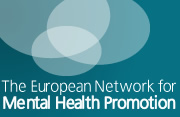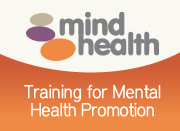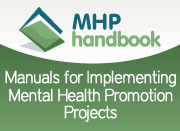Tools
- Utilities:
- Print this page
- Send this page
- Font size:
- Increase font size
- Decrease font size
Ethical Vision
 The focus of the ProMenPol project is upon developing useful tools to assist practitioners and professionals to create positive mental health environments and activities in order to promote and protect the mental health and well being of participants. These tools will be applicable in three settings, i.e. schools, workplaces and residences for older people.
The focus of the ProMenPol project is upon developing useful tools to assist practitioners and professionals to create positive mental health environments and activities in order to promote and protect the mental health and well being of participants. These tools will be applicable in three settings, i.e. schools, workplaces and residences for older people.
This involves collecting data relating to the Mental Health Promotion and Protection tools that are available and classifying them in a way that makes them more amenable to application in each of the contexts.
From this perspective, the greatest proportion of data collected relates more to the instruments themselves rather than to the intended beneficiaries of the tools. In fact, there will be no direct contact with either patients or the general public within the first two project phases – these phases being concerned with either information collection or information production.
In Phase 3, which involves pilot projects, the target groups for two of the settings study will be teenagers or adults of working age who do not have a diagnosis of mental illness. In the third setting residences for older people, where a person may be under professional care an ethical framework will constrain Phase 3 activities in the pilot site.
The Ethical Vision and Guidelines for professionals implementing the pilot studies are available on this site.
The ProMenPol principles incorporate the core values of:
- Respect for human rights, equality and diversity
- Social responsibility
- Inclusivity and voice
- Professionalism
- Legality
The Ethical Framework is based on four key values:
- Beneficence - ‘do positive good’
- Non-malfeasance – ‘do no harm’
- Informed consent
- Confidentiality and anonymity
Beneficence and Non-Malfeasance
- The research should be scientifically sound and the purpose should be able to contribute to knowledge
- Research should be preceded by a careful assessment of predictable risks in comparison with foreseeable benefits to the subject or to others
- Adequate facilities and procedures should be in place to deal with any potential hazards
Informed Consent
- Each potential subject must be adequately informed of the research
- aims
- methods
- anticipated benefits
- potential hazards and any discomfort it might entail
- participants must be given the right to refuse to participate
- documentation given to potential participants should be comprehensible
- participants must be given the opportunity to raise issues of concern
- consent should be required in writing
- records of consent should be maintained
- a complaints procedure must be available and comprehensible to all subjects
- all participants must be volunteers
- consent must be obtained from significant others where the subject does not have the legal competence to give informed consent
Confidentiality and Anonymity
- all research should conform with current data protection legislation
- all confidential details must be securely stored and only accessible to named individuals
- explicit consent must be gained from a subject to publish where details in a publication might identify that individual
Data Protection Procedures
The data security features to be adopted within the project will also be consistent with international best practice guidelines and codes.



